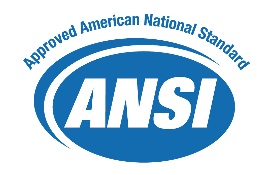An American National Standard (ANS) is a voluntary consensus standard that is developed in accordance with the ANSI Essential Requirements: Due process requirements for American National Standards and subject to ANSI’s neutral oversight and approval. These requirements are designed to ensure that development of American National Standards is a fair and responsive process that is open to all directly and materially interested parties.
Thousands of individuals and representatives of companies, government agencies, industry, labor, and trade associations, consumer groups, academics, and others voluntarily participate in the development of American National Standards (ANS) through the work of approximately 235 voluntary consensus standards bodies accredited by ANSI. The inclusiveness and integrity of the ANS process encourages participation by the broadest range of subject-matter experts, resulting in high-quality standards that protect the public and foster fair commerce and innovation.
Designation as an American National Standard (ANS) indicates that ANSI’s due process requirements – including openness, balance, and consensus – have been met in the development of a standard. But how does this translate into value?
Every ANS has a unique alpha-numeric designation based on the individual developer's naming conventions. Designations frequently include the acronym of the ANSI-Accredited Standards Developer (ASD).
ANSI/XYZ 123-2020
So how can you tell for sure?

All ANSI-Accredited Standards (ASDs) that sponsor and publish American National Standards (ANS) are required to provide public review opportunities and maintain their ANS as per the ANSI Essential Requirements. As a result, information on all proposed, approved, revised, re-affirmed, or withdrawn American National Standards is made available by ANSI through the following:
All ANSI-Accredited Standards Developers and all American National Standards are subject to ANSI’s neutral third-party oversight via ANSI’s audit program, appeals provisions, periodic review of procedures, and other checks and balances that demonstrate compliance with ANSI’s procedural requirements.
Three main oversight committees make decisions about the accreditation of standards developers and the approval of standards as American National Standards (ANS):
These groups are made up of neutral, knowledgeable professionals from ANSI's membership community, who are subject to ANSI's conflict of interest policy. They oversee the integrity of the ANS consensus process by assessing evidence of procedural compliance with ANSI's Essential Requirements.
The ExSC, BSR, and Appeals Board report to the ANSI National Policy Committee (NPC), a governance committee responsible for broad-based policy decisions regarding national standards development process issues, government relations, and public policy issues and reporting to the Executive Committee of the ANSI Board of Directors.